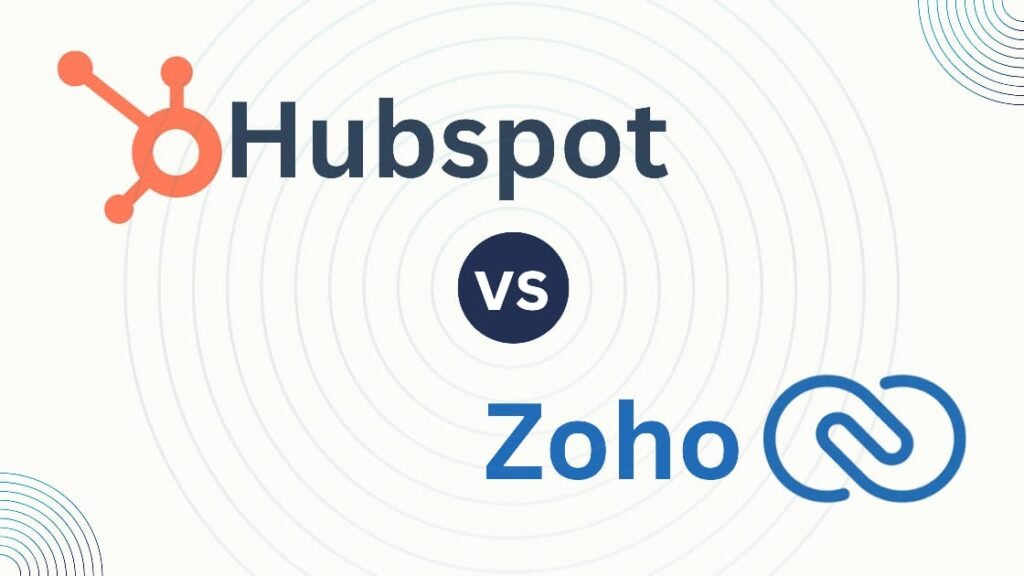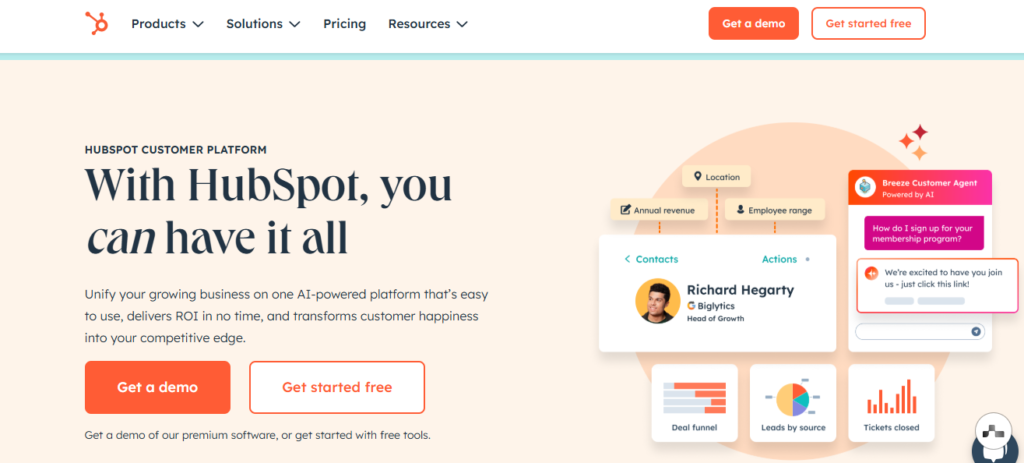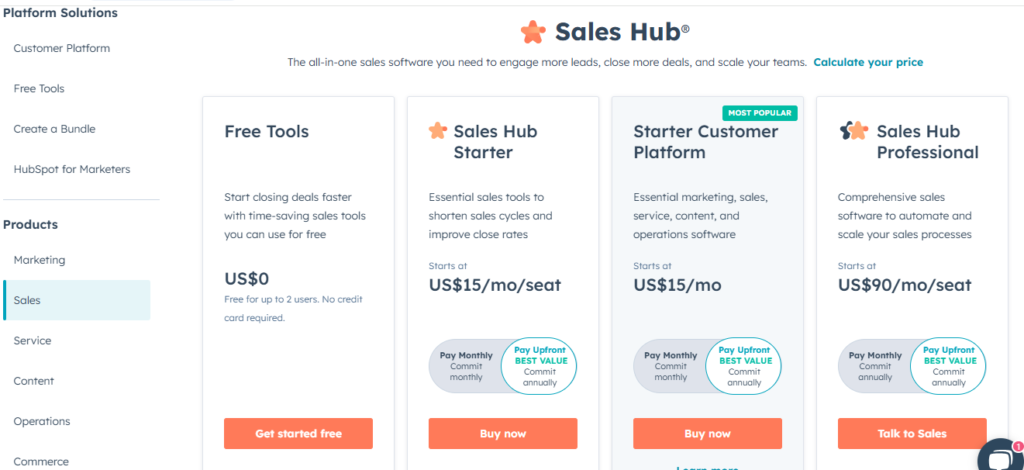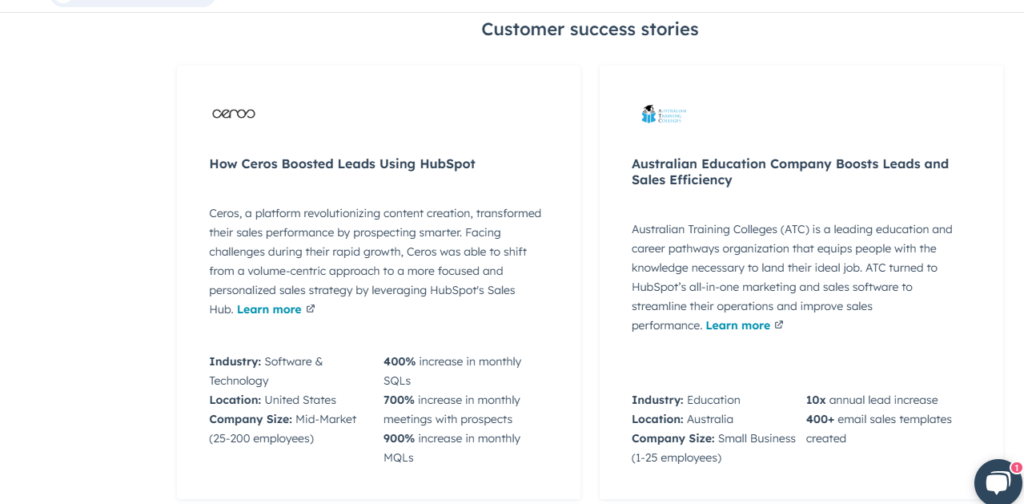By Abiola Gbolahan
Edited By Fredrick Oladipupo

Table of Contents
1. Introduction
Nowadays, every minute and every customer counts. A great CRM isn’t just about keeping your contacts organized, it’s the powerhouse that drives lead management, automates follow-ups, and provides the insights you need to grow. In this post, we’re taking a close look at the two leading CRM tools: HubSpot and Zoho. We’ll explore how each platform meets the unique demands of startups, helping you decide which one is the right fit for your business.
When it comes to the core features that really matter, both HubSpot and Zoho pack a punch. We’re talking about efficient lead tracking, smart automation, robust reporting, and clear, intuitive dashboards that let you make informed decisions. Pricing is vital too, startups need solutions that offer great value, whether it’s through free tiers or affordable premium plans. And, of course, the easier a tool is to use, the faster your team can get up and running without any hiccups.
Beyond just the basics, the real magic lies in how well a CRM integrates with your other essential tools. Whether you’re connecting to email marketing platforms, accounting software, or support services, seamless integration can transform scattered data into a unified system that propels your business forward. We’ll also look at user reviews and customer support experiences to give you a well-rounded view of how HubSpot and Zoho perform day-to-day. By digging into these aspects, we aim to provide a clear picture of which CRM could be the best partner for your startup’s journey to success.
2. HubSpot CRM Overview: HubSpot vs Zoho

HubSpot CRM is a cloud-based customer relationship management tool designed to help businesses manage contacts, track deals, and automate sales and marketing tasks. It offers a clean, user-friendly dashboard where you can monitor the entire sales pipeline in real time. Core features includes contact management, email tracking and scheduling, lead scoring, reporting dashboards, live chat, task automation, and integrations with tools like Gmail, Outlook, Slack, and Zapier. HubSpot also offers marketing tools like email campaigns, landing pages, and ad management (All under one roof).
2.1 Strengths and Unique Benefits
One of HubSpot CRM’s biggest strengths is its ease of use. Even for beginners, the platform is intuitive and requires little to no technical experience. Its free plan is incredibly generous, offering a wide range of tools without any cost, which makes it especially attractive for startups. HubSpot also stands out for its seamless integration with the larger HubSpot ecosystem which means that if your business grows, you can easily scale up to use their advanced marketing, sales, and customer service tools. The platform’s automation features and clean interface allow teams to work smarter, not harder, saving time while staying organized.
2.2 Target Audience and Pricing Overview

HubSpot CRM is built for small to medium-sized businesses, but it’s especially great for startups that want to hit the ground running with a modern, all-in-one CRM solution. It’s ideal for teams who need to track customer interactions, manage leads, and run basic marketing campaigns without the complexity or cost of enterprise systems.
In terms of pricing, HubSpot offers a forever-free plan that includes contact management, email marketing, deal tracking, and reporting. Paid plans start under the Sales Hub, with the Starter plan from $20/month per seat on monthly bill, there is upto 25% discount if billed annually, adding features like meeting scheduling and advanced support. you can also check diffrent pricing plans under marketing hub, service hub, content hub, operation hub, commerce hub. As your business grows, you can scale to Professional or Enterprise tiers for more in-depth automation, analytics, and customizations.
3. Exploring Zoho CRM: HubSpot vs Zoho

Zoho CRM is a comprehensive and flexible customer relationship management platform designed to help businesses of all sizes manage their sales, marketing, and customer support in one place. Known for its versatility, Zoho CRM allows users to capture leads from multiple channels, automate routine tasks, and analyze customer data through detailed reporting. It’s part of the larger Zoho ecosystem, which includes over 40 integrated business apps from email and project management to finance and HR. This makes it a powerful tool for startups looking to centralize operations.
3.1 Key Features and Customization Options
Zoho CRM shines in its ability to be tailored to your specific business needs. It offers features like contact and lead management, email marketing, sales automation, workflow rules, forecasting, AI-powered sales assistance (via Zia), and customizable dashboards. One of its standout features is the deep level of customization, it allows users to create custom modules, fields, layouts, and workflows without needing advanced coding skills. Whether you’re a tech startup or a service-based business, you can mold the platform to fit your processes, not the other way around.
3.2 Pricing Structure and Scalability for Startups

Zoho CRM offers a 15-day free trial, along with a free edition for up to 3 users, which is great for very small teams or solo founders just starting out. Its paid plans are among the most affordable in the CRM space, starting at $12/user/month billed annually for the Standard plan, which includes sales forecasting, custom reports, and workflows. As your startup grows, you can scale up to the Professional ($20/user/month) or Enterprise ($35/user/month) plans, unlocking more advanced features like blueprint workflows, webhooks, and deeper analytics. This flexibility makes Zoho CRM a budget-friendly, scalable option for startups ready to grow without breaking the bank.
4. Side-by-Side Comparison: HubSpot vs Zoho
| Feature | HubSpot CRM | Zoho CRM |
|---|---|---|
| Ease of Use | Very beginner-friendly with a clean, modern interface. Ideal for non-tech users. | Slightly steeper learning curve due to deep customization, but still intuitive. |
| Core Features | Contact management, email tracking, deal pipeline, reporting, live chat, task automation. | Lead scoring, workflow automation, email marketing, sales forecasting, AI assistant (Zia). |
| Customization | Limited in the free plan; advanced options available in paid tiers. | Highly customizable — from layouts and fields to workflows and automation rules. |
| AI Capabilities | Basic AI tools in higher plans (like predictive lead scoring). | Zia AI offers sentiment analysis, best-time-to-contact suggestions, and anomaly detection. |
| Integrations | 1000+ integrations including Gmail, Outlook, Zapier, Slack, Stripe, and others. | Integrates with 500+ apps including Google Workspace, Mailchimp, Microsoft 365, and other Zoho apps. |
| Scalability | Easily scalable within the HubSpot ecosystem (Marketing, Sales, Service Hubs). | Grows with your business; flexible modules and pricing fit startups to enterprises. |
| Mobile App | Available on iOS & Android; highly rated for ease of use on the go. | Also available on iOS & Android; includes location-based check-ins and calls. |
| Support & Resources | Knowledge base, community forum, email/chat support (phone for paid users). | Extensive documentation, webinars, 24/5 support on higher plans. |
| Free Plan | Yes – forever free with unlimited users; limited features. | Free for up to 3 users with basic CRM tools. |
| Entry-Level Pricing | Starts at $20/month/seat for Starter (Sales Hub). | From $14/month/user for Standard. |
| Top-Tier Pricing | Enterprise plans from $120/month/seat, includes advanced automation & analytics. | Top-Tier plan like Enterprise starts at $40/month/user with AI, sandbox, advanced customization. |
| Best For | Startups focused on marketing and sales automation with simple setup. | Startups needing flexible workflows, deep customization, and AI-powered insights. |
5. User Reviews on Both Platforms: HubSpot vs Zoho
5.1 HubSpot CRM
Users often praise HubSpot CRM for its clean and intuitive interface, making it easy for beginners and small teams to get started without technical help. The free version gets high marks for offering generous features like email tracking, contact management, and pipeline visibility without asking for a dime. Many appreciate how everything works seamlessly within the HubSpot ecosystem, especially when combining sales and marketing tools.

However, some users mention that once a business begins to scale, the cost of premium features can become a concern, especially for startups with tight budgets. On the support side, users say HubSpot’s customer service is responsive and helpful, particularly for paid plans. The availability of tutorials, community forums, and a large knowledge base also makes onboarding easier.
5.2 Zoho CRM
Zoho CRM users frequently highlight the platform’s strong customization capabilities. Small businesses and startups love that they can tailor modules, dashboards, and workflows to match their exact processes without needing a developer. The platform is especially popular among teams that value flexibility and deeper control over their CRM setup.

That said, some users find the initial learning curve a bit steep, especially for those unfamiliar with CRMs. While Zoho offers affordable pricing, a few users have reported that customer support can be hit-or-miss, especially on lower-tier plans. Still, the documentation and self-help resources are extensive and usually enough to solve common issues. check out some verified reviews here
5.3 Recurring Themes
Across reviews on platforms like G2, Capterra, and Trustpilot, several consistent themes emerge. HubSpot is loved for its user-friendliness and fast setup, but can become expensive as you grow. Zoho CRM is applauded for its rich features and customization at an affordable price, but may require more time to master.
For startups, HubSpot is often chosen for quick adoption, while Zoho is favored by teams willing to invest a bit more time upfront for greater control and scalability in the long run.
6. Pros & Cons: HubSpot vs Zoho
| CRM System | Pros | Cons |
|---|---|---|
| HubSpot CRM | – Free to start – User-friendly interface – Seamless integration with marketing tools | – Premium features can be pricey – Limited customization in the free version |
| Zoho CRM | – Highly affordable – Extensive customization options – Robust feature set | – Steeper learning curve – Interface can be less intuitive for beginners |
7. Conclusion: HubSpot vs Zoho
Choosing between HubSpot CRM and Zoho CRM ultimately depends on your startup’s specific needs, budget, and future goals. Both platforms are industry leaders in the CRM space and offer powerful tools to help you manage leads, improve customer relationships, and grow your business.
If you’re looking for a plug-and-play CRM that’s beginner-friendly, has solid marketing automation, and comes with a generous free plan—HubSpot CRM is a great choice. It’s especially ideal for early-stage startups that need to hit the ground running with minimal setup. Its clean interface and seamless integrations make it easy to adopt across your team.
On the other hand, if your startup requires a more flexible, customizable solution that can be tailored to match complex workflows, Zoho CRM might be the better fit. It offers more control at a lower cost, making it suitable for teams that are a bit more tech-savvy or have unique sales processes that off-the-shelf tools can’t fully support.
7.1 Tips for Selecting the Right CRM
Consider your team size: HubSpot is best for lean teams that need quick adoption, while Zoho fits startups with technical members who can tweak the system to their liking.
Evaluate your budget: Zoho’s pricing is more affordable long-term, especially if you plan to expand feature use. HubSpot can get expensive as you scale.
Think about future growth: If you plan to expand into more advanced marketing, sales, and customer service tools later, HubSpot’s ecosystem makes scaling smoother.
Assess customization needs: Choose Zoho if you want to build a CRM experience that’s fully yours with custom fields, layouts, and workflows.
Looking for More Useful Tech Comparisons?
Here are 5 helpful reads that can guide your decision-making in other areas of digital tools and AI solutions:
- Khanmigo (Khan Academy AI) vs Quizlet AI: Which is Better for Personalized Learning?
A head-to-head breakdown of two AI-powered educational tools, comparing how well they support students and self-learners with personalized study plans. - SEMrush vs Ahrefs AI: Best AI Marketing Insight Tool
Dive into the world of SEO and competitor research with this detailed comparison of two top-tier marketing platforms powered by AI. - Surfer SEO vs Clearscope: Best AI-Driven SEO Optimization Tool
Discover which of these AI content optimization tools offers better keyword insights, content scores, and workflow efficiency for marketers. - ChatGPT vs Jasper AI: Which is Better for Generating Marketing Content?
Not sure which AI tool to use for writing blog posts, ad copy, or emails? This post compares ChatGPT and Jasper AI based on creativity, tone, and ease of use. - Notion vs Evernote: Which Productivity Tool is Best for You?
Whether you’re organizing your thoughts or managing team projects, find out which note-taking tool is better suited for your workflow.



Pingback: Keeper Tax For Freelancers: How to Save Big on Keeper - Platform Adviser